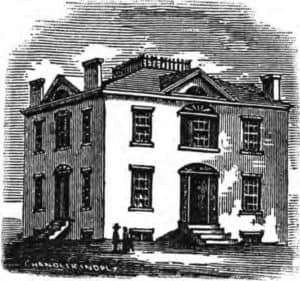Lew Wallace was what today would be called an alternative learner. In his much-less-polite day, many in Indianapolis referred to Lew, the governor’s son, as rascal and worse.

As a youth running around the capital city, Lew and his friends found their way into the basement of the governor’s house. The house stood in the middle of the circle downtown where the Soldiers and Sailors Monument would, decades later, be built. For different reasons, this house was never occupied by any governors, but was used instead by others. One of the occupants in Lew’s day was Judge Isaac Blackford, who lived in and worked out of the old mansion. Many of the other local attorneys and judges began to use this house as an informal place to meet and socialize.
The Haunted Basement
The basement of the house was a vast, unlighted cellar filled with boxes, barrels, and as Lew wrote in his autobiography, “. . . debris of such varied ins and outs as to be dangerous, if not quite impassable, to the unfamiliar.” The basement was also supposed to be haunted by a workman who, on good authority, was buried deep in the dark, dank cellar.
Lew and a few of his cohorts found this haunted basement and its intrigue impossible to pass up. They used the lower area of the house as a meeting and rendezvous spot much as the lawyers did upstairs. Boys being boys, they decided it would be fun to take long poles and punch the underside of the floors as the attorneys were engaging in their discussions.
The more the men yelled and stomped their feet, the louder the boys would hit the underside of the floor. The rascals could easily hear when the men were headed to the basement to apprehend the criminals. At that point, the boys scattered into the dark recesses of the cellar to preselected hiding places.
After a couple of these episodes, the men turned the tables and had the local sheriff of the court and several bailiffs lie in wait for the boys. At the first thump, the cellar doors were seized shut and with lanterns each boy was fished out by his shirt collar. As Wallace wrote: “With an inconceivable hardness of heart, the myrmidons took us up-stairs and before the judges. There I made the acquaintance of Isaac Blackford . . .”

Lew eventually struck out on his own when his father had had enough of his poor behavior and poor scholarship. During this time, he undertook the study of law. He also grew increasingly interested in the turmoil in Texas. He discovered that he had a gift for public speaking when he began recruiting men to fight in the Mexican War.
Blackford and The Bar Exam
Imagine Lew’s dismay when, a few years after his haunted basement escapade, he appeared in court to take the bar examination. “We advanced and stood in a body outside the railing. As we did so, I observed the clear, gray eyes of his honor, Isaac Blackford, rest on me with a look so sharp and cold it shot me full of rigors. He had waited a long time for what the baseballists would call his innings. At last it was come. Would he make a worm of me and thread me on his hook?”
The good judge did not make a worm of Lew and thread him on a hook. The judge made no speech, but rather gave the young men their instructions and sent them with a bailiff off to a room to take the exam.
The exam took hours to complete. At the end of the ordeal, Lew was not particularly satisfied with his answers. As he recorded in his autobiography, at the bottom of the last page he wrote a note, “. . . the flippancy of which makes my face burn as I now write:
‘Hon. Isaac Blackford, Examining Judge: Dear Sir,–I hope the foregoing answers will be to your satisfaction more than they are to mine; whether they are or not, I shall go to Mexico. Respectfully, Lew Wallace.”
Two or three days after completing the examination, Wallace received a letter from the post office: “Supreme Court-Room, Indianapolis. Mr. Lew Wallace: Dear Sir—The Court interposes no objection to you going to Mexico. Respectfully, Isaac Blackford.”
As Wallace noted in his memoirs, the communication was not attached to a license to practice law. It took service in the Mexican War and the love of a good woman named Susan to bring Lew successfully back to his law studies in the early 1850s.